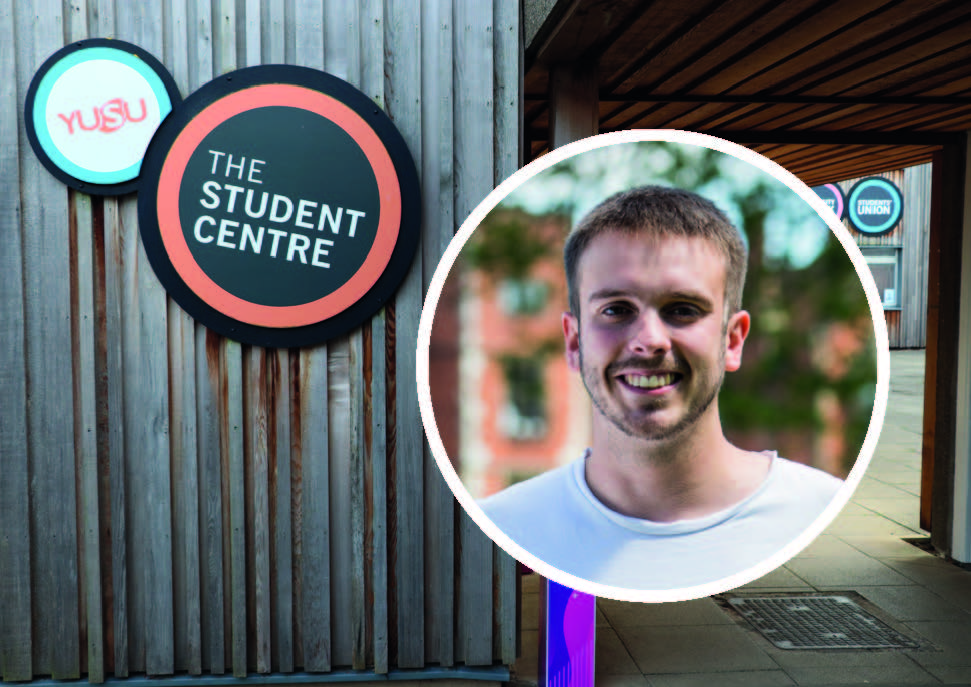Two years after he was elected as YUSU’s Activities Officer, I sat down with Ollie Martin to discuss the realities of a YUSU election campaign, and life in an often demanding role.
We started by looking back to student life, and Ollie told me that he never had much interaction with the world of student politics, so the decision to run wasn’t long in the making.
“When I was on the Halifax committee, I dealt with YUSU for organising Freshers’ and events, paying for venues or booking acts, so I didn’t have to engage too much with the politics.”
“I remember sitting at the sabb speeches in my first year being like ‘what’s the deal here?’ so it wasn’t anything I saw myself doing from day one. It was a couple of months before the election, after I saw things I could change and improve, things I was frustrated about, that I decided to go for it.”
“Something really useful for me was speaking to previous sabbs, a range of people who had done the job, and I asked them about the role. There are friendly people still keen to be reached out to and happy to help.”
Of course, this year’s campaign will be like no other, with the pandemic meaning no in person campaigning, and one year with a cardboard-free campus. The one thing it won’t change is the importance of getting the word out.
Speaking about his experience, Ollie said that “it was a bit of a whirlwind, and there were definitely times when I felt I’d just been thrown in at the deep end, in that I didn’t have an enormous idea of what was happening.”
“This year will be completely new ground, and that’s really exciting. Everyone running will obviously need to hit social media really hard, but it will be interesting to see how people replicate that word of mouth factor.”
In the role, much of Ollie’s focus was on events, both on and off-campus, and he told me this was a real area of pride and he “enjoyed having people start engaging with the event forums, getting some good dialogue.”
“We did really well in terms of getting things on in The Lounge. I was really pleased with the momentum with student groups picking up and putting things on in there, and I think that would have snowballed into something bigger if the pandemic hadn’t happened. I hope it still does”
Another big project on events was the push for a Students’ Union building, which Ollie told me there had been progress towards in his year in the role.
“We had really promising consultation sessions with University and architects, and were able to get some stakeholders excited about the idea that this was something we needed. That’s one of the projects where there is no immediate gratification, but through small systemic change we hopefully planted a seed that will grow at some point.”
This focus on events was something relatively new that Ollie brought to the job, and he told me he felt that the variety of the Activities Officer role was a real positive.
“It covers a really wide range of stuff, and inevitably some things will get more attention than others from different people, but that’s no bad thing. Every year will be so unique, and throw up a lot of surprises.”
One of the areas that he told me he definitely wasn’t confident about coming in was student media, which he now describes as “the most misunderstood thing at the University.”
“I came in and I was really apprehensive about media, spending hours trying to get people to explain how it all worked. I was completely wrong, and media were always a highlight to deal with.”
“Student media challenges the Union, and that can be really difficult, but that’s healthy, because we all care and we’re all on the same side.”
“With societies in general, there is such a huge portfolio of groups, and they all know what they do and they do it really well. The skill, for this year more than ever, is taking what groups are doing well and sharing those ideas between societies.”
A constant criticism at election time is that it can be unclear exactly what a union can do. Ollie told me he believes this is a challenge that all SUs share, in helping people to understand what YUSU does through “clear messaging about its functions and limitations. Let’s make it really clear who people are, what the Union does and what the roles do.”
This year, planning events with any certainty, and predicting the position we will be in by the time the next academic year begins, seems almost impossible, so I asked what he would do if he was running now.
“The problem now is that you have to make plans for every eventuality, so that massively increases the workload required to make anything work. Even if in-person events can happen, there will still need to be plans for a possible outbreak or any other challenge. I would be careful about promising anything too concrete.”
“When lockdown began, students worked out what they were doing way faster than I did, and were so creative. Supporting societies and individuals to be creative and run stuff is going to be the way to do things if we still need to stay in small groups. York has this amazing structure of small groups of people, they’re called societies!”
With one final piece of advice to those considering following him into a sabb role, Ollie said that “people don’t need to want to do it as a career, you don’t need to be an aspiring politician.”
“I’m now an electronic engineer at a robotics firm, which you wouldn’t think a sabb job leads to, but it was a really helpful year. People shouldn’t be put off running if they don’t want to be in student politics for the rest of their lives, and it’s actually really helpful to have people from different backgrounds.”

